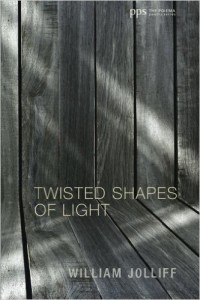Twisted Shapes of Light
Reviewed by Michael S. Glaser
February 1, 2016
 By William Jolliff. Cascade Books, 2015. 81 pages. $13/paperback; $9.99/eBook.
By William Jolliff. Cascade Books, 2015. 81 pages. $13/paperback; $9.99/eBook.
Buy on FJ Amazon Store
The poems in Twisted Shapes of Light by William Jolliff are sensitive, genuine, and true to the experiences of our lives. They convey a gentle empathy with the ordinary and often overlooked, and they do so with language that is uncomplicated by the gyrations of the politically correct and unsullied by the blindness of privilege. I found myself increasingly drawn into and enriched by the lives of the folks who people the pages of this book and the lens through which the poet understands them.
Jolliff uses the stuff of his life (farmer, teacher, father, philosopher, questioner, observer, and more) in ways that let us know we are all fellow travelers on this journey. He invites us to join him on his faith journey (“Lord, that parable raises certain doubts”) and as he slogs through the soggy earth of his father’s farm or rides for 12 hours on his father’s tractor; he brings us to the church dinner to share with him “Miss Liza Langrall’s coconut cake” (“In my memory / it’s all music”); and he brings us into his classroom to wonder with compassion at the tender and anxious lives of his students.
I especially admire how he takes the occasion of a five-year-old’s question about the Bible to share with us what he did not share with her—the confusions and the discoveries which lead him
to a deep sense of my own complete perfection,
held in tension with my contempt for and terror
of my deep perversity.
His poems remind us of how harshly we may judge ourselves and invite us to celebrate with him not only our own lives but also the lives of each other.
Writing teachers are quick to tell their students “write what you know.” Jolliff’s Twisted Shapes of Light illustrates someone doing that with unusual candor, courage, and skill. Each poem leaves us with a deepened sense of understanding and compassion for our own journey and for the tensions and complexities of the human experience—the struggles and joys, and the need to accept the fact that we each have far less control over our lives than we would like to believe, as in “Spring Plowing” in which the speaker finds himself
waiting, waiting, good God, for better weather.
And that, Gentle Reader, is why I left
the farm.
While I recommend most every poem in this collection, there are single lines worth the price of the entire book: for example, “What good is memory, if it’s not forgiving?” writes Jolliff near the end of “The Sheep Farmer.” Other lines strike me as encapsulating the essence of experience, like the last line of “Sermon for a Monday”: “This world is a sad and hostile place. It is also Paradise.”
These are poems that disarm you with their humility; the old notion of poet as prophet is turned on its head into “the poet as questioner, wonderer, doubter, speculator.” “What if . . .” the poems often seem to ask, but these are not simply “what ifs”: they are wise “what ifs.”
Jolliff’s wry and self-effacing sense of humor embraces our human folly (including his) with the kind of genuine interest that is found at the root of human kindness.
Most every one of these poems hit the experiential nail squarely on the head of what I hope to find in a poem: enlightenment, aha moments, insight, companionship on the journey, new eyes and ears with which to see and hear. I am confident most everyone who values poetry—and many who thought they didn’t—will be grateful for this book. It is simply superb!



Comments on Friendsjournal.org may be used in the Forum of the print magazine and may be edited for length and clarity.